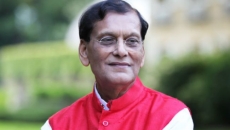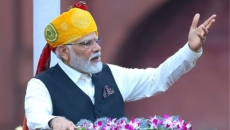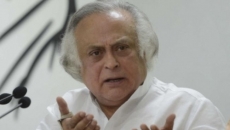Chandigarh, Nov 17 (IANS) Known for his path-breaking work on Pahari paintings, internationally-acclaimed art historian and an authority on miniature painting, Chandigarh-based Brijinder Nath Goswamy, passed away on Friday following prolonged ill health.
Recipient of the Padma Shri and Padma Bhushan awards, 90-year-old Goswamy, fondly called BNG in art circles had authored more than 26 books.
A former civil servant who quit the services in 1958 to dedicate himself to academics and research, Goswamy took immense interest in the social background of painters from Kangra and spent a considerable time in far-flung villages of Himachal Pradesh to get a better understanding of the artists who created Pahari paintings.
B N Goswamy, 90, doyen of #Pahari art passed away this morning.
— Sharad Mohan شرد ਸ਼ਰਦ शरद শরদ (@ssharadmohhan) November 17, 2023
His demise leaves behind a void, a vacuum which won't be filled soon
His favourite was this c1740 CE, by #Nainsukh of #Guler #HimachalPradesh who made this at #Jasrota #Jammu
Now at @britishmuseum
'The Trumpeters' pic.twitter.com/ly2AO2FWkB
Learning the Takri Pahari script, he began focusing on family styles, looking in detail for the technique, narratives, and composition.
“All my life I have striven to bring the painter out of obscurity. I want him in the front row. He must be under the spotlight. But how does one do that? Isn't art anonymous?
“Sadly, there is no proper documentation, the artist just appears like a firefly in the dark. We must peep into the mind of the artist, identify his processes, develop respect, and decipher.
“Then, we get to know about the sociological and cultural facts of that era. You see, an art historian needs to be a compound of a camel, hawk, ant, and peacock. He must have the memory of a camel, the eye of a hawk, be industrious as an ant, and learn to enjoy art like a peacock. After all, it's not botany, right?” he had said.
His ‘Wonder of the Age, Master Painters of India, 1100-1900’, an exhibition at the Metropolitan Museum of Art in New York showcased a new dimension of Indian art to the world.
For someone who taught himself the Pahari script in order to get a rounded view of the work he was doing, he always felt that it was paramount for a teacher and researcher to go into the field, read, study, interact with people, learn new languages, and understand one’s roots.
Always stressing on the need for archiving and preserving, His last lecture was held in Chandigarh on October 26 on his latest book, 'The India Cat: Stories, Paintings, Poetry and Proverbs.'
Delving into the stories fables from Panchtantra, Jatakas, Katha Sarita Sagar, he created a picture of how cats were viewed in India and how they found an important place in Indian art.






